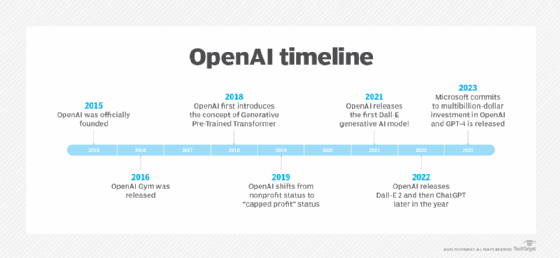Google's Dominance Under Threat: The Case For A Breakup

Table of Contents
Anti-Competitive Practices Stifling Innovation
Google's vast empire extends across multiple digital sectors, leading to concerns about anti-competitive behavior that stifles innovation. This dominance manifests in several key areas:
Search Engine Monopoly
Google's near-total dominance in search engine market share significantly hinders smaller search engines from gaining traction. This is achieved through several tactics:
- Limited organic reach for competitors: Google's algorithm often prioritizes its own services, making it difficult for competitors to appear organically in search results, even if they offer superior results.
- Algorithmic favoritism towards Google's own products: Google's search results frequently feature its own products and services prominently, regardless of their merit compared to competitors. This creates an unfair advantage, diverting traffic and revenue away from other businesses.
- Difficulty in attracting users away from the established giant: The sheer brand recognition and ingrained user habit of using Google Search makes it incredibly challenging for smaller search engines to attract users, even with innovative features. This network effect solidifies Google's monopoly.
Android's Market Control
Google's Android operating system controls a massive portion of the global mobile market. This control creates significant barriers to entry for other mobile platforms.
- Pre-installed Google apps and services giving unfair advantage: Android devices often come pre-installed with a suite of Google apps, giving them a significant advantage over competitors. Users are more likely to continue using these familiar services.
- Restrictions on app developers who don't comply with Google's terms: Google's app store policies often favor its own services, creating difficulties for developers who don't comply with its terms and conditions.
- Limited choice for consumers regarding operating systems: The dominance of Android limits consumer choice and prevents the emergence of competitive mobile operating systems, hindering innovation in the mobile space.
Advertising Dominance
Google's control over advertising platforms like AdSense and AdWords gives them an unfair advantage over competitors.
- High barriers to entry for smaller ad platforms: Google's scale and market share make it difficult for smaller advertising platforms to compete effectively.
- Favorable ad placement for Google's own services: Google's ad algorithms often prioritize its own services, ensuring prominent placement and higher click-through rates compared to competitors.
- Domination of the online advertising market restricts competition: Google's control of a significant portion of the online advertising market limits competition and reduces opportunities for smaller businesses to effectively advertise their products or services.
Stifling Consumer Choice and Innovation
Google's monopolistic practices significantly stifle consumer choice and innovation across various sectors.
Lack of Alternatives
Google's dominance limits the number of alternatives available to consumers, thereby hindering the development of innovative products and services.
- Limited choices in search engines, mobile operating systems, and online advertising: The lack of viable alternatives reduces consumer power and limits their ability to choose services that best meet their needs.
- Reduced consumer control over their data: Google's vast data collection practices raise concerns about user privacy and lack of control over personal information.
- Inhibits the emergence of potentially superior products and services: The lack of competition prevents the development of superior products and services that could benefit consumers.
Data Privacy Concerns
Google's massive data collection across its various platforms raises significant data privacy concerns.
- Data aggregation across multiple services creating a comprehensive user profile: Google collects vast amounts of data across its various services, creating detailed profiles of individual users.
- Lack of transparency regarding data usage and sharing: Concerns exist regarding the lack of transparency around how Google uses and shares this collected user data.
- Potential for misuse of personal information: The potential for misuse of this comprehensive user data raises significant ethical and legal concerns.
Impact on Smaller Businesses
Google's dominance creates significant challenges for smaller businesses attempting to compete in the digital marketplace.
- Difficulty in gaining visibility in search results: Smaller businesses often struggle to gain visibility in Google search results due to the dominance of larger companies.
- High reliance on Google's advertising platforms leading to increased costs: Smaller businesses frequently rely heavily on Google's advertising platforms, leading to increased costs and dependence.
- Uneven playing field creating barriers for startups and small businesses: This creates an uneven playing field, making it extremely challenging for startups and small businesses to compete effectively.
Legal Precedents and Regulatory Actions
The arguments for a Google breakup are bolstered by a history of antitrust concerns and ongoing regulatory scrutiny.
Past Antitrust Cases
Google has faced numerous antitrust cases globally, with varying degrees of success for regulatory bodies. Analyzing these cases reveals patterns of anti-competitive behavior and the challenges of regulating such a powerful tech company. Specific cases and their outcomes should be detailed here.
Current Regulatory Scrutiny
Google is currently facing significant regulatory scrutiny from various authorities worldwide, including the EU and the US. These investigations focus on various aspects of Google's business practices, including its search dominance, Android operating system, and advertising practices. Details on these ongoing investigations and their potential implications should be included here.
The Argument for Breakup
The argument for breaking up Google centers on fostering increased competition and innovation. Breaking Google into smaller, independent companies could:
- Increase competition: A breakup would create a more level playing field, enabling smaller companies to compete more effectively.
- Boost innovation: Increased competition would likely lead to more innovation, as companies strive to differentiate themselves and offer better products and services.
- Improve consumer choice: Consumers would have a wider range of choices in search engines, mobile operating systems, and other digital services.
However, potential challenges exist, including the complexity of disentangling Google's interconnected services and the potential for unintended consequences. Addressing these challenges requires careful planning and execution.
Conclusion
Google's dominance poses significant challenges to competition, innovation, and consumer choice. The arguments for a Google breakup are compelling, stemming from years of anti-competitive practices and concerns about data privacy. While a breakup presents complexities, the potential benefits—a more competitive and innovative digital landscape—justify serious consideration. We need to actively engage in the conversation around Google's market power and advocate for policies that ensure a fairer, more open internet. Let's continue the discussion about the need to address Google's dominance and explore solutions to create a healthier digital ecosystem. Is it time for a Google breakup? Share your thoughts!

Featured Posts
-
 Understanding The Use Of Tik Tok To Avoid Trump Tariffs
Apr 22, 2025
Understanding The Use Of Tik Tok To Avoid Trump Tariffs
Apr 22, 2025 -
 Building Voice Assistants Made Easy Open Ais 2024 Developer Announcements
Apr 22, 2025
Building Voice Assistants Made Easy Open Ais 2024 Developer Announcements
Apr 22, 2025 -
 Sweden And Finlands Military Integration A Pan Nordic Defense Strategy
Apr 22, 2025
Sweden And Finlands Military Integration A Pan Nordic Defense Strategy
Apr 22, 2025 -
 Beyond The Headlines A Comparative Analysis Of Blue Origin And Katy Perrys Public Perception
Apr 22, 2025
Beyond The Headlines A Comparative Analysis Of Blue Origin And Katy Perrys Public Perception
Apr 22, 2025 -
 Cnn Exposes Tik Toks Role In Circumventing Trump Tariffs
Apr 22, 2025
Cnn Exposes Tik Toks Role In Circumventing Trump Tariffs
Apr 22, 2025
